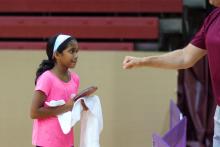When I coached table tennis in a school program, I was coaching up to 90 kids per day. Over the last 20 years, I have seen thousands of kids play (or attempt to play) table tennis. Sarah Jalli is one of my top juniors and recently went up 1000 rating points in 10 months and is now ranked #4 in the US for her age. With the right environment and a great work ethic, Sarah definitely has Olympic potential. So why is it that some kids rise to the top and others stay at the lower level?
Desire
The first aspect of success is desire. Personally, I will not coach a student who is forced to play by his/her parent. It would be a waste of my time and a waste of the parent’s money. Players who have a desire to work hard and a desire to succeed can become champions.
Attitude
The second aspect of success is attitude. No matter what happened at school, no matter what happened anywhere else, the player must enter the training hall with the proper attitude. It is difficult to learn with a cocky attitude. It is difficult to learn with a sleepy attitude. It is difficult to learn with an I-don’t-care attitude. It is difficult to learn with a distracted attitude.
Talent
The third aspect of success is talent. Talent is the ability to learn something quickly or develop new skills quickly. As a coach, I’m always looking for kids who have good coordination, kids who are athletic, kids who learn quickly, and are naturally gifted. However, even if the talent isn’t there, I’m still willing to help. The student just needs to keep in mind that some skills may take longer to develop.
Environment
The fourth aspect of success is having the ideal training environment. The environment consists of having a knowledgeable coach, a variety of practice partners for drills and games, other kids with the same goals, and regular tournaments (12-30 per year). This is the reason that I’m planning to expand the Samson Dubina Table Tennis Academy – so that we can have more professional coaches on staff, weekly leagues throughout the year, and monthly 4-star tournaments. Including practice, lessons, matches, and tournaments, young players should be playing at least 10-15 hours per week by age 9-12. By age 13, the player will need to practice at least 12-20 hours per week.
Support
The fifth aspect of success is the support from the parents – both verbally and financially. For the player to succeed, the parents should be onboard with encouraging words, with going to tournaments, and with talking about table tennis throughout the week. The parents also need to financially back the child. With most elite coaches charging $60-$90/hour for lessons, it is sometimes tough for them to pay for 5-10 hours of private lessons per week. However, the investment in the early years is important. For the first several years, the foundation is being grounded. How strong should the foundation be? It depends how high you want the tower of success to be! After several years, the focus shifts to tournament performance. Without the right financial support, it is extremely difficult to the player to rise to the top.
Persistence
The final aspect of success is persistence. Some years, the player may gain 1000 points; some years, the player may gain 100 points; some years, the player may go down 100 points. For sure the journey to success isn’t easy. There will be many setbacks, disappointments, and failures. According to the Olympic Committee, table tennis is ranked as one of the most difficult sports in the world to learn. The journey is tough. However, persistence pays off long term.
Follow Sarah’s example. Her life is a good reflection of all six of these areas. This is the reason that I expect success.
Sarah, I look forward to helping you on your journey.
Sarah Jalli

Follow her example in these 6 areas
Category:



